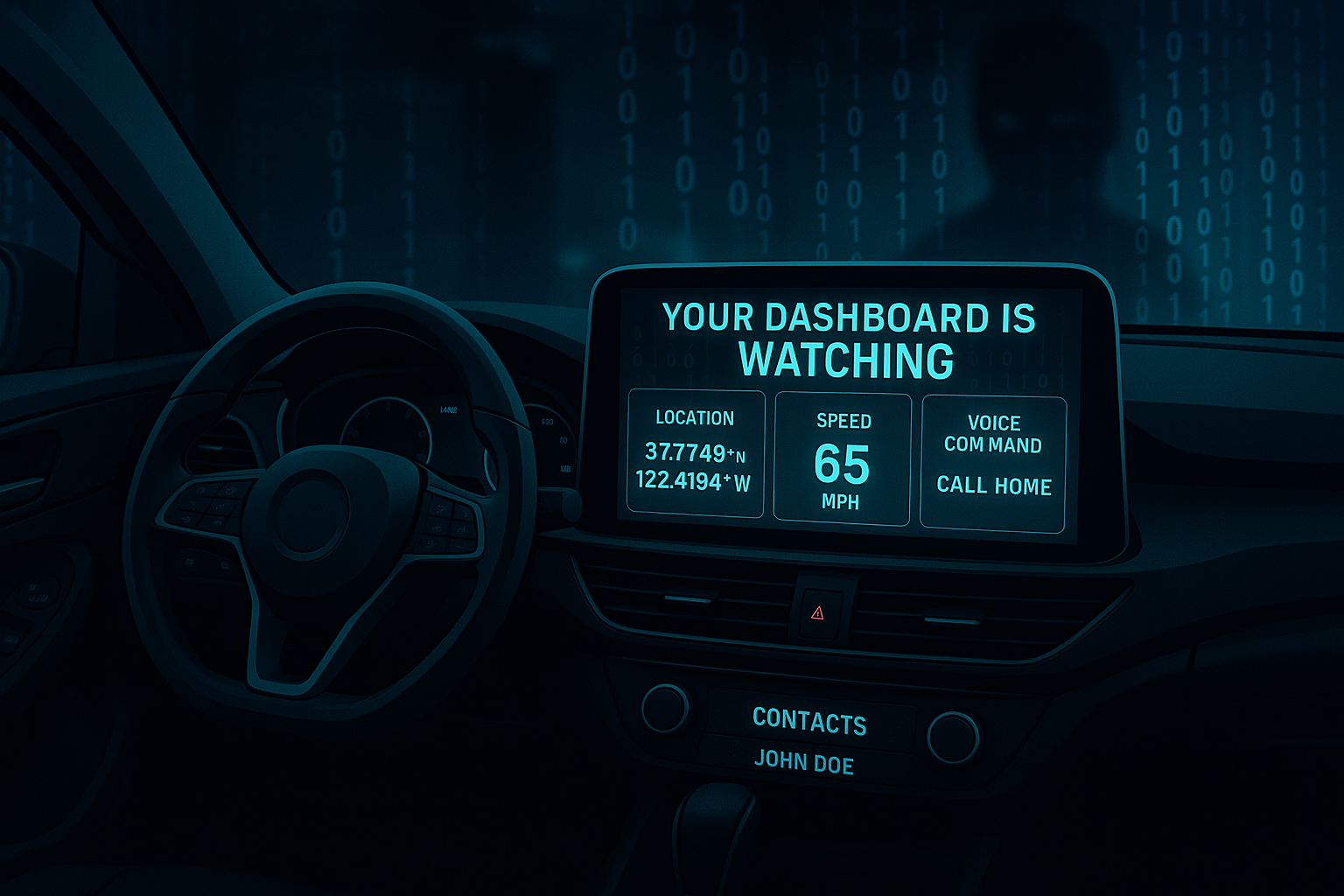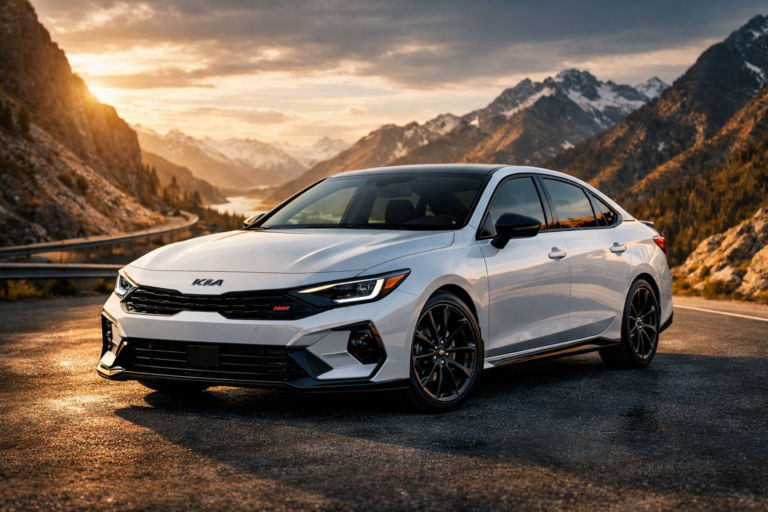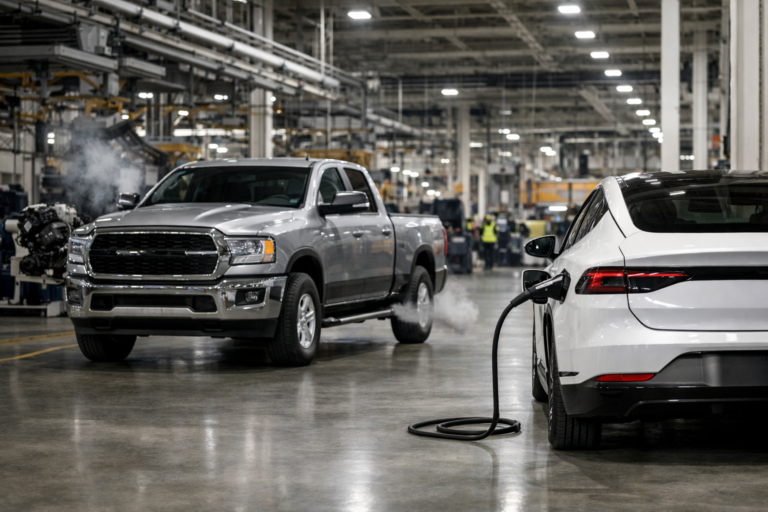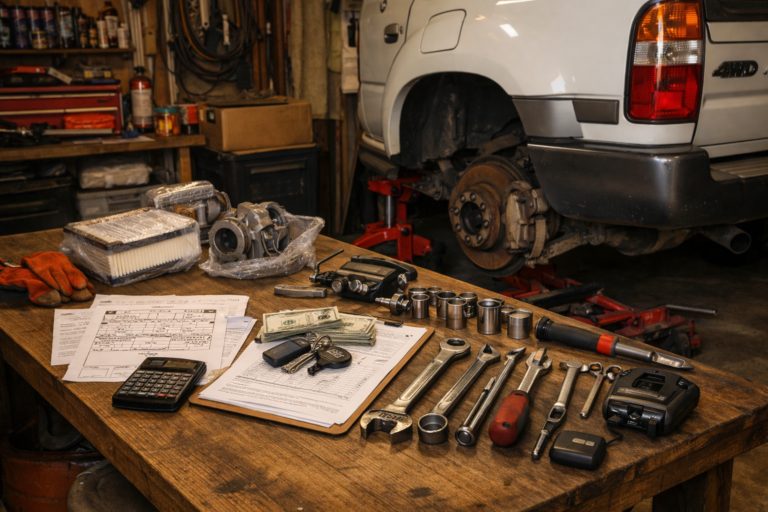You’re out for a drive, thinking your car is just there to get you from A to B. But have you ever wondered what your car knows about you? Turns out, it might know more than you’re comfortable with.
We’ve all accepted that our smartphones, TVs, and smart speakers are watching us, silently collecting data on everything from our shopping habits to how often we order pizza at midnight. But surely our cars, those trusty hunks of metal and rubber, are safe from this data-snooping craze, right? After all, a car’s just supposed to get us from point A to B without the need for Wi-Fi and a degree in cybersecurity.
Well, buckle up, because the modern car isn’t just a mode of transportation—it’s a surveillance machine on wheels, hoarding more data about you than you probably realize. That quiet, unassuming dashboard? It’s collecting, storing, and sometimes even sharing data on everything from your driving habits to your favorite coffee stop. So the next time you go for a drive, consider that your car might be watching you, and not in the “keeping you safe” way you’d hope.
The Surveillance Machine on Wheels: What Your Car Knows About You
So what exactly are automakers collecting? Let’s start with the basics: location data. Thanks to GPS, your car always knows where you are, and more importantly, where you’ve been. Every drive, every stop, every detour is logged and stored. A simple trip to the store, a late-night stop at the drive-thru, or a spontaneous road trip—your car remembers it all. It’s like having a nosy friend who notes every time you step out for a snack, except you can’t tell it to mind its own business.
Then, there’s the driving data. Speed, braking habits, acceleration patterns, and even how sharply you take turns—your car is quietly taking notes. This isn’t just data collection; it’s an automotive dossier on your driving style. Are you a Sunday driver or a speed demon? Do you brake gently, or are you slamming the pedal at every stop sign? Your car knows, and so do the folks back at automaker HQ, analyzing and categorizing every detail.
And it doesn’t stop there. Modern cars are now equipped with sensors that track seat belt usage, passenger occupancy, and even the music you play. Some advanced systems can even detect fatigue by monitoring your eye movements. Yes, the car is watching you that closely. The irony? If a person followed you around, tracking your every move and habit, you’d call them a stalker. But when it’s your car, it’s called “technology.”
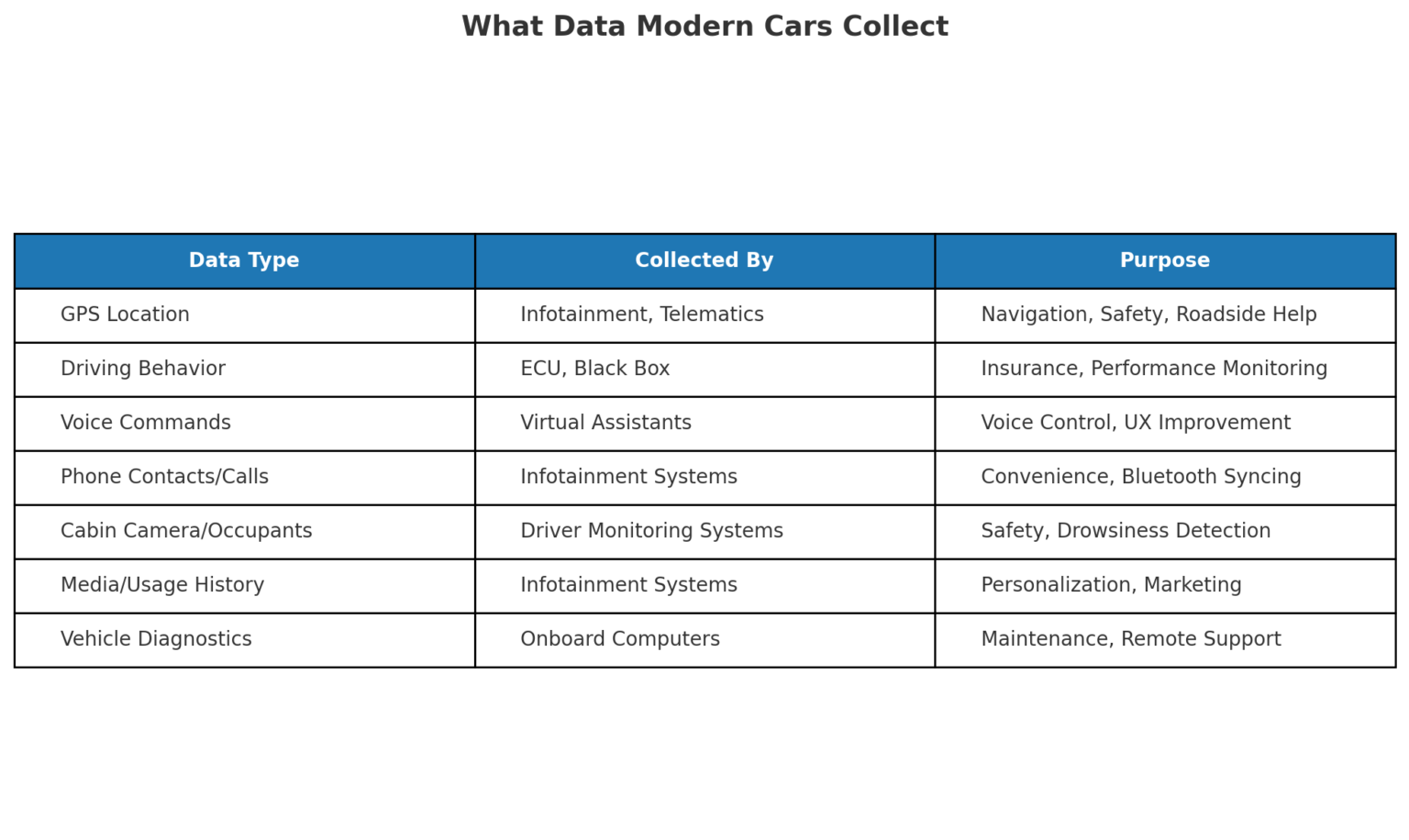
Cybersecurity Risks: The Dangers of a Connected Car
All this data collection would be unnerving enough on its own, but it gets worse. With connected and autonomous vehicles on the rise, our cars are becoming ever more entwined with the digital world. And while that sounds convenient—real-time navigation, remote control features, over-the-air updates—it also opens up a whole new can of worms. Because where there’s connectivity, there’s a risk of hacking. After all, if your fridge can be hacked, what’s stopping someone from cracking into your car?
Picture this: you’re driving down the highway, minding your own business, when suddenly your car’s music system starts blaring ABBA at full volume, and no amount of button-mashing will turn it off. Annoying? Absolutely. But the reality could be much worse. Researchers have already shown that hackers can access a car’s critical systems—steering, brakes, even acceleration—through its connectivity features. Imagine someone remotely controlling your car while you’re on the road. It sounds like the stuff of sci-fi horror, but it’s a very real possibility in today’s connected world.
What’s more, this data isn’t just staying with the car. Automakers, tech companies, and even third-party vendors are getting in on the action, accessing the treasure trove of data your car collects. And while these companies assure us they have “rigorous cybersecurity measures,” we all know how well that usually goes. Just ask any major company that’s ever had a data breach (hint: there are a lot of them).
The Ethics of Data Collection: Who’s Really in the Driver’s Seat?
All this leads us to a rather unsettling question: Should a car be watching its driver? After all, when you buy a car, you’re paying for transportation, not a chaperone that logs your every move. Sure, some of this data collection can be beneficial—think of advanced safety features that help prevent accidents or warn you of potential hazards. But at what point does “safety” become “surveillance”?
For most of us, driving is one of the few activities where we still feel a sense of freedom. There’s something undeniably liberating about being behind the wheel, heading wherever you want, whenever you want. But if your car is constantly watching, recording, and possibly sharing your data, how free are you, really? It’s like having a car that’s permanently eavesdropping on you, nodding along to your Spotify playlist while taking notes on your late-night snack runs. At some point, we have to ask: Do we really need our cars to know so much?
The ethical concerns don’t end there. Who owns this data? Is it the driver, who’s generating it, or the automaker, who’s collecting it? Right now, most automakers claim ownership over this data, and they’re often vague about how they use it. It’s a murky world where our personal information is bought, sold, and traded like some kind of black-market currency. If cars are becoming data-collection machines, shouldn’t we, the drivers, have a say in what’s collected and how it’s used?
What If Your Car Could Blackmail You?
Let’s take a step back and think about the potential for misuse. Imagine a world where your car is not only gathering data on you but using it in ways you’d rather it didn’t. Maybe it starts “helpfully” reminding you of your speeding habit. “Would you like to slow down?” it chimes in, “We’ve noticed you’ve exceeded the speed limit 14 times this month.” Or perhaps it holds a few secrets it could use against you—like your detour to a fast-food drive-thru right after the gym.
Picture it: your car notices you’ve skipped three oil changes, taken a few too many sharp turns, and regularly indulge in late-night drive-thru runs. So it begins “offering” you discounts on health insurance or maintenance packages, subtly suggesting that if you don’t take care of yourself (or the car), it might just become a little less cooperative. It’s not hard to imagine a future where cars are basically blackmailing their owners. You want to get out of that speeding ticket? Well, maybe you’ll need to buy this pricey software update. Oh, you’d like to lower your insurance premium? Sure thing—just keep it under 50 mph from now on.
The idea may sound ridiculous, but in a world where data is king, who’s to say where the line will be drawn? Once you give a company access to your data, there’s no telling how they’ll use it—or whom they might sell it to.
The Bottom Line: Is Convenience Worth the Cost?
In the end, this all boils down to a simple question: Is the convenience of connected cars worth the cost to our privacy? Sure, it’s nice to have navigation, streaming, and real-time traffic updates all at our fingertips. But we’re giving up something precious in return—the right to drive without being constantly observed.
Perhaps one day, we’ll look back on this era and laugh at the notion of cars collecting data on their drivers. But for now, it’s a very real concern, one that’s only going to grow as cars become more advanced, more connected, and yes, more intrusive. So the next time you’re on a leisurely drive, enjoying the freedom of the open road, remember: your car is right there with you, logging every turn, every mile, and every stop. It’s your car, but is it truly yours anymore?
Discover more articles by clicking here.

